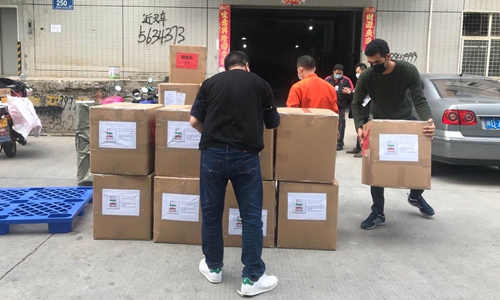HOME >> CHINA
Iranians in China collect donations for home country amid coronavirus outbreak
By Xie Wenting Source:Global Times Published: 2020/3/13 20:43:40

Iranians in China collect donations for their home country in the battle against the coronavirus. Photo: Courtesy of Farnaz shirani
While thousands of miles apart from their family members and friends, Iranians in China now feel more than ever that they are emotionally attached to them as the country battles the severe coronavirus outbreak. With mounting infection cases and a higher mortality rate, as well as a lack of medical supplies in the Middle East country, Iranians in China exhibiting strong solidarity have mobilized to offer help to their home country by collecting donations and passing China's experiences in fighting the epidemic.
Farnaz Shirani, a PhD candidate at the Xiamen University in East China's Fujian Province, told the Global Times that her group Hamyari, an association which mostly consists of Iranian students in China, has raised 124,351 yuan ($17,764) so far and have bought medical supplies, including protective clothing, thermometers and oximeters.
Shirani has a tight schedule as she is busy collecting donations. She said at the beginning most of their donations came from the Iranian community, but now many people from China and other countries have extended a helping hand.
Shirani's group pays for the shipping fees of all the medical equipment to Iran that they acquired from China and will try to send them to some of the hospitals in need and deprived.
"The capacity of hospitals has been completed but the number of patients is increasing every day. Doctors and nurses have been facing a shortage in medical equipment and we have already lost many of our nurses and doctors, and if this situation continues, we will, unfortunately, face a shortage of specialist medical personnel in Iran. So, we have decided to help even if it's very small," she told the Global Times.
Shirani lost one of her relatives last week from coronavirus. "Dealing with a loss is never easy," she said.
An N95 mask can cost about 16 yuan or even more in Iran, but it's still hard to purchase it. She now talks to her family every day because she was extremely worried about their health. Her brother and many relatives are doctors who work full-time in hospitals. "So I wake up anxious every day to make sure they are fine," she said.
Shirani also tried to pass on information and experiences she had gained about the virus in China to her friends and acquaintances in Iran.
She stressed during the interview that the Iranian government "should have acted more seriously and quarantined the city of Qom like Wuhan in China…If the government quarantines cities and controls traffic, it can dominate the situation faster. In my opinion, the Chinese government has done very well in this regard, and other countries should also use its experience in controlling this epidemic."
Despite some people saying Iranians are resenting China because they thought Chinese people brought this virus, Shirani said what is really important now is how "we can prevent the outbreak and save the lives of more innocent people" rather than pinning fault on some other people. She thanked the help they have received from China.
Faezeh Jamshidi, who is responsible for scientific affairs at the Iranian students' association in Shanghai, told the Global Times that most Iranians in China live in Beijing, Shanghai and capital cities in southern China. They study in Beijing and Shanghai, and those doing business in China vary according to region. For example, in Guangzhou most run clothing businesses and in Yiwu, many people's jobs are related to the fabrics business.
Most people in these regions are devoted to the fight against the virus and many have volunteered to collect donations for Iran.
"The situation is very serious in Iran as many people got infected. Also, we have our New Year celebration in less than 10 days. Although the government wants people to stay home, some people don't care," she said.
According to Jamshidi, Iranian students in Shanghai have a WeChat group of more than 200 people where they share information about how to stay safe. She said she was particularly worried about the safety of her 92-year-old grandmother.
Jamshidi's family lives in Neyshabur, Iran. Her parents originally wanted her to stay in Iran until everything goes well in China, but now they do not want it anymore after China has made great progress in curbing the spread of the virus, she said.
"As far as I know, most people who work in China want to come back from Iran," Jamshidi said. She added that during the past two weeks, she did not hear any Iranian in China say they wanted to return.
Newspaper headline: Iranians in China collect donations for home
Posted in: SOCIETY